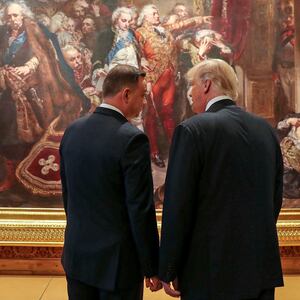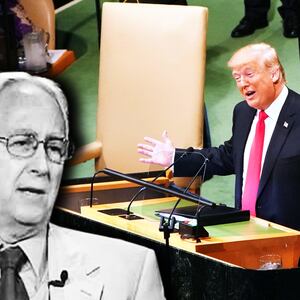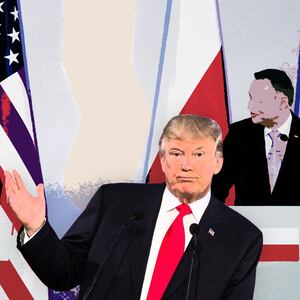WARSAW—“It is astonishing,” said Georgette Mosbacher, that “public figures would attack journalists who are fulfilling the functions of an independent media.”
Well, yes. And when Mosbacher was the latest version of the political hostess with the mostest—a “cosmetics impresario and eccentric grande dame of GOP fundraising,” as The Washington Post called her—that might have been an anodyne remark. But Donald J. Trump made Mosbacher the U.S. ambassador to Poland, and this was a defense of press freedom that seemed at a minimum unlikely from a Trump envoy.
Indeed, Mosbacher could have been talking about the U.S. president’s own treatment of Jim Acosta or April Ryan. But the rebuke was directed at the Polish populist Law and Justice (PiS) government as part of a harsh letter to Prime Minister Mateusz Morawiecki after the government’s latest attack against the TVN television network, whose status as arch-enemy is not unlike that of Trump’s nemesis CNN.
ADVERTISEMENT
If Mosbacher’s “astonishing” missive last week seems surprising to Americans accustomed to Trump’s habitual tirades against “Fake News Media,” they were all the more startling to Mosbacher’s Polish hosts. The reaction was vehement, almost visceral, with lots of capital letters screaming anger on social media.
“So @USAmbPoland SUPPORTS ANTI-POLISH actions of TVN and supports their goal of OVERTHROWING the legal government of Poland,” Krystyna Pawłowicz, the ruling party’s most outspoken politician, exploded on Twitter.
Others were equally indignant, although not on the record. One official complained anonymously that Poland is being treated like a “Bantustan,” one of the statelets set aside for black citizens by the apartheid-era rulers of South Africa. And Sieci, a prominent pro-government weekly, appealed directly to Trump, asking on its cover, “Who did you send us here, Mr. Trump?”
Mosbacher declined to be interviewed for this article.
Mosbacher’s comments were all the more shocking, because after all, she was supposed to be a perfect fit as Trump’s representative in Poland. Her predecessor, Paul W. Jones, was by all accounts a respectable figure. But that was part of the problem: As an Obama appointee and a career diplomat, he was seen by Warsaw as having no clout in Trump’s D.C. He also irked the illiberal government here by making known his displeasure with the systematic dismantling of the system of checks and balances under PiS’ rule.
According to diplomatic sources whom I talked with, he had held several talks on this topic with Jarosław Kaczyński, the party’s chairman and the country’s de facto ruler. After Trump’s election, the pressure subsided, but the perceived slight was not forgotten in Warsaw.
So when Jones’ term was up, Poland—one of the very few European governments praised by Trump—requested that, instead of another professional diplomat, the administration send a political appointee— someone with a direct line to the president, someone they could do business with without being harassed about such trifles as the rule of law or democratic principles.
In Georgette Mosbacher, they seemed to get exactly what they wished for. The fiery-haired, thrice-married socialite and prominent GOP donor is considered among the best connected people in the Swamp. Her acquaintance with Trump goes back 30 years; her parties and fundraisers were regularly attended by all the establishment bigwigs, from Roger Ailes to Mitch McConnell to Michael Bloomberg. She is also a character. In an interview with the Financial Times, she revealed she intended to clone her Cavalier King Charles spaniel, a comment she made while wearing a dress adorned with the dog’s face.
According to people who know her, politically she’s a mainstream Republican. But her bold, energetic, and blunt manner is not unlike that of Donald Trump. And that’s not the only similarity. Coming from humble roots in Indiana, she also considers herself an outsider. She once described herself as “a redneck who lives on Fifth Avenue.” She married three times, always to rich men: first to real-estate developer Robert Muir; then Faberge executive George Barrie; and finally Robert Mosbacher, an oil magnate who served as the secretary of commerce under George H.W. Bush.
Like Trump, Mosbacher takes pride in her business acumen, in her case with the Borghese cosmetics line, and she is keen on economic issues.
“She is a force of nature,” says Daniel Fried, a fellow at the Atlantic Council. (Columnists in the States have dubbed her “Hurricane Georgette” and “Monsoon Mosbacher.”) “She has excellent political instincts and a way of connecting with people,” Fried tells me.
“Most of all, she has a strong network of contacts in the White House. Not just Trump, but with pretty much all of the members of his Cabinet. She knows everyone in Washington,” says Fried, a veteran diplomat who served as the U.S. ambassador to Poland under President Bill Clinton and as assistant secretary of state for European and Eurasian affairs under Barack Obama.
Soon after Mosbacher’s arrival in late August, when I asked Victor Ashe, George W. Bush’s envoy to Poland, what he thought of her, he also gushed about her “high energy level” and stressed that she would focus on economic issues. He was later proven right.
PiS politicians, meanwhile, sounded hopeful, if not outright enthusiastic.
“The new ambassador, in contrast to the previous one, is... personally connected to Donald Trump and is not a professional diplomat. That means there’s hope for quicker flow of information and more political rather than diplomatic contacts with the U.S.,” Ryszard Czarnecki, a PiS member of the European Parliament, told me back in June. And in September, just after the ambassador arrived in Poland, Prime Minister Morawiecki said on Twitter he had come to know Mosbacher “as a great friend of Poland.”
She made a positive first impression. As one of her initial acts, she announced she would make Congress include Poland in the Visa Waiver Program, which has been a longstanding Polish demand. (Poland is one of only five European Union members whose citizens have to get a visa to enter the U.S.)
The honeymoon was soon over, however. During a meeting with lawmakers in the Polish parliament in November, Mosbacher declared she did not like diplomatic language, and then proceeded to issue a stern warning against any threats made to the freedom of the press in Poland.
“If there’s one thing that unites Republicans and Democrats completely, it is the freedom of the press,” she said. “Congress will not tolerate such things. I just wanted you to know this. I will not be able to help you... If there is any law that will touch on that, I will not be able to do anything,” she said.
Mosbacher was referring to the long-announced, but still unrealized ambition of the government to “repolonize” or “deconcentrate” foreign-owned media, including TVN, owned by the U.S.-based corporation Discovery Inc. The goal of such a reform would be to take over the media, which, according to Morawiecki, is “80 percent foreign, belong to the opposition, and in the many various ways try to falsely represent the reality and cheat the voters.”
But Mosbacher’s warning—delivered to the cheers of opposition and marked chagrin of the governing party—was not her last word on the subject.
Around the same time, the government launched its latest attack on TVN. Based on the testimony of the organizer of a “Hitler birthday party,” the authorities launched an investigation into the actions of TVN journalists who helped expose a small and secretive group of Polish neo-Nazis.
The man, who faces charges of propagating fascism and in whose home the police found Nazi paraphernalia, alleged that the fascist party was staged and paid for by the network.
The Nazi’s words were immediately taken at face value by the pro-government media, and later by PiS politicians, like Interior Minister Joachim Brudziński, who stated on Twitter that the whole affair “looks like it was a disgusting, repulsive provocation, which devastated Poland’s image in the world” and called on the American owners of TVN to address the allegations. They did, and denied everything.
What’s more, TVN cameraman Piotr Wacowski, who along with two other journalists infiltrated the group, was photographed performing a Nazi salute. The act was done presumably to gain credibility with the extremists, but it turned out to be enough for the government to launch a formal investigation.
The cameraman was soon visited at his home by the Polish Internal Security Agency, which delivered a summons for questioning. The authorities were ready to prosecute the man, but after the uproar it caused, decided it was “premature” to bring charges against him.
All this proved to be too much of an outrage for Mosbacher. On Nov. 19, she wrote her blunt but typo-riddled letter to the prime minister—she misspelled Morawiecki’s and Brudziński’s names, and addressed the head of government as just “minister,” but she made her point clearly enough, calling the government’s actions “baffling” and “astonishing.”
“I hope that members of your government will refrain from attacking, let alone prosecuting, independent journalists, who articulate public interests and strengthen our societies” she said.
The letter was not meant to be published, but a summary of its content was leaked by Polish officials to Do Rzeczy, a pro-government weekly. This started an anti-American uproar not seen in Poland since the fall of communism.
And Mosbacher did not back down. In a subsequent interview with the Do Rzeczy, she apologized for the typos, but not for the letter itself.
The overt reactions by PiS officials were relatively muted. Minister of Defense Mariusz Błaszczak said he is treating Mosbacher’s behavior as a result of her inexperience; former Foreign Minister Witold Waszczykowski called her a “New York celebrity” and described her as “unprofessional.” Yet in off-the-record conversations, they were much more outspoken, saying that Mosbacher behaved as if she were not an ambassador but a “governor” or “viceroy.”
One PiS politician, who at the time of Mosbacher’s nomination had openly praised her, now tells me on background that she’s a “charlatan” and her connections to Trump were “way overstated.”
The pro-government commentators went further still. Stanisław Janecki, a right-wing pundit who reportedly once served as an unofficial adviser to PiS leader Jarosław Kaczyński, ironically thanked the ambassador for “showing us, troglodytes, how we should behave in the presence of higher civilizations.”
To Daniel Fried, the retired diplomat with 40 years of experience, such rhetoric is unwarranted.
“While I regret the leak of her letter, Ambassador Mosbacher was and is doing the right thing: trying to help a friendly government avoid an unnecessary problem. Not only is she a good friend of Poland, she is an influential one trying to help. There is no ‘arrogance,’” he said.
Such outrage directed at American officials is unprecedented in Poland, which remains one of the most pro-American nations in Europe. It is even more unusual for PiS, which embraced Trump when most other European governments criticized him. It has even proposed naming a U.S. military base in Poland after him.
Noting this, officials tried to differentiate between the person of the ambassador and the administration she represents. The government spokesperson Joanna Kopcińska stated that the “incident” with Mosbacher’s letter —to which the government refused to respond—will not spoil the “excellent relations with the U.S.” Some, like PiS politician Ryszard Legutko, suggested that Mosbacher’s actions were her own initiative and were done without Trump’s knowledge.
That is only partially true.
“I think Ms. Mosbacher, who has played with heavyweights before and very clearly has her own set views of what American values are, is going to be a surprise to Trump and PiS,” a veteran U.S. diplomat told me. “Having said that, though, I can’t imagine an ambassador saying what she said without clearance from main State.”
“I suspect Secretary of State Pompeo is running interference for her,” said the same diplomat. “As long as Trump doesn’t have a personal interest in a particular controversy, I think he [Pompeo] can get away with that.”
Another U.S. diplomat who has worked at the U.S. Embassy in Warsaw said that although the letter might have been Mosbacher’s idea, there is “no way it wasn’t approved by State.”
“She definitely has her own way of doing things and wants to do new things here in Poland,” a source close to Mosbacher told me. “But it’s not like she’s out there all on her own. She works in tandem with her deputy Eric Green, a seasoned diplomat. And yes, she is blunt, and energetic and probably arrogant. But she has very powerful friends in Washington, and enjoys a special rapport with [National Security Adviser John] Bolton.”
On Tuesday last week, U.S. State Department spokesperson Heather Nauert confirmed that Mosbacher enjoys the full support of the U.S. government and is doing “a great job” representing the U.S. and its “ideals and values.”
Ah, but nothing is ever simple with the Trump administration.
Many in Poland question whether Mosbacher’s defense of the free press and TVN in particular is motivated purely by concern over democratic values. And they have a point. At least as important—if not more so—are commercial interests.
Since 2015, TVN has been owned by U.S. corporations. First by the Tennessee-based Scripps Network Interactive, and then by Discovery, which acquired Scripps in 2017. One former State Department official admits Discovery’s interests are an important consideration driving the issue.
“Certainly Discovery will long have been in discussions with the State Department about its concerns in Poland. The embassy has previously highlighted concerns about actions against TVN in the annual Human Rights Report, and its internal reporting will have been more pointed and stronger,” notes the retired diplomat who requested to remain anonymous in order to speak freely. He also recalled that the U.S. State Department itself previously issued a rebuke of the Polish government after TVN had been fined for “promoting illegal activities,” i.e. allegedly biased reporting on a heated protest outside the parliament.
But the fact that commercial interests matter greatly to the U.S. is not exactly a secret.
“U.S. diplomacy is traditionally oriented toward promoting the interest of its businesses, much more so than other countries, like Poland,” said Michal Baranowski, Warsaw office director at the German Marshall Fund, an American think tank. “In a way, this is a continuation of this longstanding policy. That’s not to say that the question of values is irrelevant.”
Baranowski worries that the current spat with Mosbacher will spiral out of control and do lasting damage to strategic relations. “Both sides should take a step back and reconsider their actions,” he says.
Poland is the most important U.S. ally in Central and Eastern Europe and forms a key part of NATO’s eastern flank bordering Russia. The two countries are in talks regarding a building that new U.S. military base dubbed “Fort Trump” by Polish President Andrzej Duda.
In a handwritten note on the margin of her letter, Mosbacher hinted that questions like press freedom could get in the way “of the really important things.”
The same point was highlighted by a newly elected Democratic congressman from New Jersey, Tom Malinowski. In a recent interview with Wirtualna Polska, Malinowski said that with a Democratic majority in the House, Congress will take a much stronger position on democratic backsliding in Europe. Asked what actions it will take, he responded: “I will ask myself this question whenever I get requests from Polish officials about enhancing our security cooperation.”
The feud has shown few signs of subsiding. After the initial leak of the letter on Monday last week, Polish officials made another leak to Do Rzeczy on Tuesday evening, complaining about the ambassador’s “scandalous” and “arrogant” behavior while lobbying for preferential tax treatment of U.S. companies like Uber. A government official told Do Rzeczy “the ambassador invited us for meetings in a way that suggested it was not an invitation but an order.”
A source in frequent contact with Mosbacher admits he’s baffled by the leaks and the tone used by the officials. He notes that although the ambassador’s behavior may have been brash, the matter could have been resolved behind closed doors, rather than pushing it out in public.
“I can only think of two reasons for that. Either this is an element of a war between factions within PiS, or the government is trying to force Mosbacher out,” he says, adding that the chances of the latter actually happening are slim. “She is close with John Bolton, and she is after all pursuing U.S. policy goals—also those of America First. They wanted a political ambassador, they got one.”











